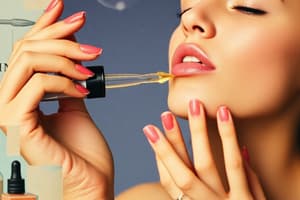Podcast
Questions and Answers
What is elevation in the context of nail application?
What is elevation in the context of nail application?
- The degree by which the brush is lowered
- The position of the hand when applying nail product
- The degree or angle by which the brush, hand or fingers are raised (correct)
- The angle used to create a smile line
What is a protractor?
What is a protractor?
An instrument shaped as a semicircle marked with the degrees of a circle, used to measure or call out angles.
Negative means the fingers or brush are lifted from the surface.
Negative means the fingers or brush are lifted from the surface.
False (B)
Positive refers to when the fingers or brush are lifted or raised producing an angle.
Positive refers to when the fingers or brush are lifted or raised producing an angle.
What is the 0-degree position?
What is the 0-degree position?
The cosmetologist angles the client's fingertip down at the __________ degree position.
The cosmetologist angles the client's fingertip down at the __________ degree position.
What happens at the 90-degree position?
What happens at the 90-degree position?
What does Zone 1 consist of?
What does Zone 1 consist of?
What constitutes Zone 2?
What constitutes Zone 2?
Define Zone 3.
Define Zone 3.
In a 3-ball application, the first ball is applied to the cuticle area.
In a 3-ball application, the first ball is applied to the cuticle area.
What is the purpose of the 2-ball method in nail application?
What is the purpose of the 2-ball method in nail application?
What does the 1-ball method involve?
What does the 1-ball method involve?
Flashcards are hidden until you start studying
Study Notes
Terminology Definitions
- Elevation: Refers to the angle at which the brush or fingers are raised, affecting the application technique.
- Protractor: A semicircular tool used to measure angles, ensuring precision in cosmetic procedures by accurately determining desired angles.
- Negative: Describes the technique where the brush or fingers remain flat against the surface without lifting, ensuring a smooth application.
- Positive: Indicates the technique of lifting the brush or fingers away from the surface to create an angle, enhancing the design.
Positioning Techniques
- 0-degree position: Achieved when the arm and hand rest steadily on a surface, allowing even acrylic application at the nail tip and creating a smile line using the brush's belly.
- 45-degree position: The client's fingertip is angled downward, utilizing the brush to spread product in the c-curve, employing a stroking motion for blending.
- 90-degree position: The hand is raised, and acrylic is applied in the cuticle area with the brush tip while avoiding contact with the skin.
Nail Zones
- Zone 1: Represents the free edge, including the smile line, highlighting the entire extent of the nail tip.
- Zone 2: The stress area located at the center of the nail plate, essential for structural integrity and aesthetics.
- Zone 3: Encompasses the cuticle area around the nail plate, critical for proper nail health and application.
Application Methods
- 3-ball application: Involves strategically applying three balls of product; the first at a 0-degree for the smile line, the second at a 45-degree for the stress area, and the third at a 90-degree to fill the cuticle area, avoiding skin contact.
- 2-ball method: Focuses on applying two balls; the first at a 0-degree for the tip and smile line, and the second at a 90-degree for reinforcing the extension, utilizing a large acrylic ball for coverage.
- 1-ball method: Uses a large ball applied at a 45-degree angle over the stress area and quickly blending it into the cuticle at a 90-degree angle, finishing with a free edge at a 0-degree angle.
Studying That Suits You
Use AI to generate personalized quizzes and flashcards to suit your learning preferences.




